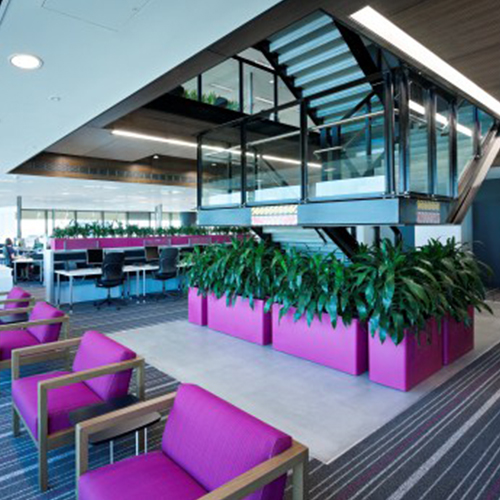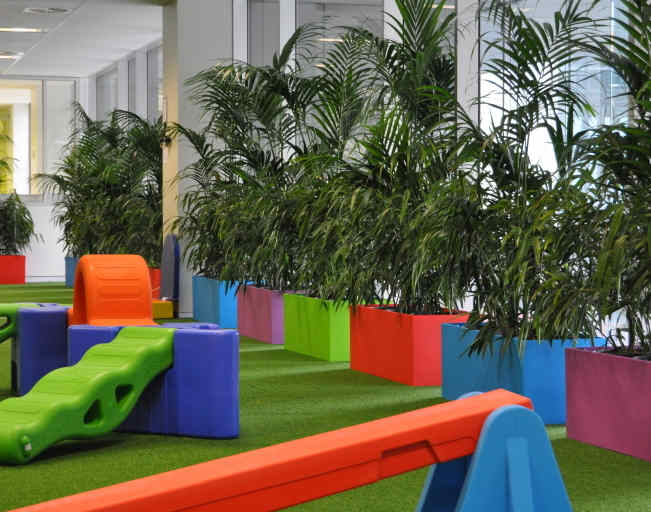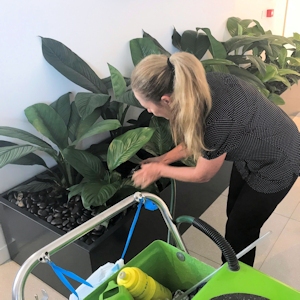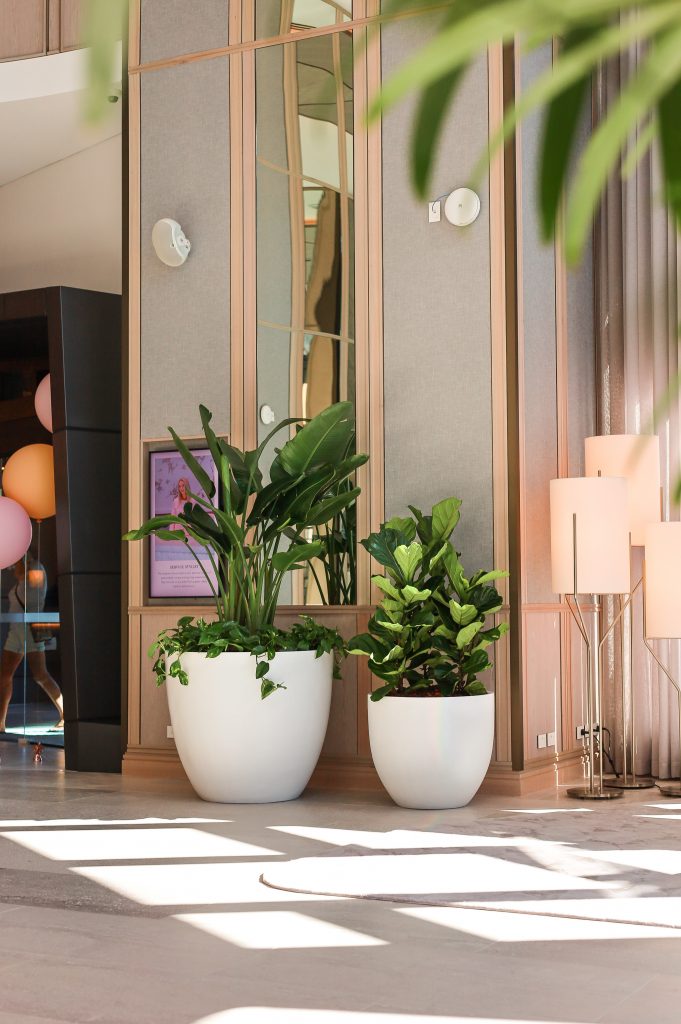Why won’t anyone give me a simple price list?
Because this is a difficult question.
The price varies according to many things, these include:
- Type of containers. Some designer containers can cost up to $500 each. You are hiring these containers but the hire company needs to pay for them and they are usually bought specifically for you. Sometimes it may take up to three years for a hire company to recover the cost of the pots. If they lose the customer before the required time period, they are left “holding the baby”. That is why we require contracts for large or “out of the ordinary” installations.
- Type of plant. Rhapis Palms cost twice as much as a Dracaena Janet Craig.
- Type of Mulch. If you need something special; expect to pay more – Example – white or black pebbles. Decorative pebbles can cost as much as a plant.
- Time is money. If you are on the sixth floor without a lift, it will be more difficult to service your plants so expect to pay a bit more.
- Plant Replacement. A room without windows is not favourable to plant growth and so plants will need changing more often. Plant replacement depends on the lighting, air conditioning, type of plant, the watering regime and planter configuration – BUT mainly the light.
- You get what you pay for. This is particularly true in the Indoor Plant Hire Industry. If replacement costs are not correctly factored into the monthly rate, some months down the track the plant hirer will not have the funds to replace the plant. I have had one report of a company that would not replace a plant because the budget for that customer, was used for the month.
These are some of the variables to consider before a price is given.
So before you go for the cheapest price, remember, “the bitter taste of poor quality remains long after the sweetness of a good price is forgotten”.
What should I expect?
You have a right to expect:
- To get what you pay for – look for a specification, it should detail:
- Type of plant
- Size of growing pot
- Type and size of the decorative container.
- That the plants always look their best – if not ring and have it replaced
- To know who is on your premises – service staff should have uniforms
- That the mulch always looks its best – you should not see the soil or the growing pot.
Invoicing, Weekly or Monthly?
We invoice monthly and quote monthly rates. Be aware of prices quoted per week. Some companies quote weekly prices, this may involve 4 extra billing periods per year and does not guarantee weekly servicing. The only way to compare prices is by converting the quoted rate to an annual amount.
The longer the contract the better the price. Most businesses will give a better price for a longer contract.
What am I actually getting?
Don’t be fooled by an attractive website. Determine whether the photos are of actual work by the company or simply stock photos from some suppliers catalogue.
Has the quotation a SPECIFICATION clause? What size pots, what size plants, what type of plant? An old trick is to quote one type of plant and then in a few months replace it for something cheaper and/or smaller.
When a plant deteriorates – and one will (possibly the day before the National Manager arrives), how long before replacement. Same day service is best.
What sort of mulch is best. What about the mulch, should it be Coconut fibre (Coir), pebble, Plastic Pebbles, recycled glass or what. Fibre is practical and is suitable in a lot of situations and is a sustainable resource. It is easy to remove and replace – but it is messy, however, it keeps the price down. Decorative pebbles or glass may cost as much as a small plant and they are labour intensive.
How often should the plants be watered? Fortnightly watering is a general guide but this depends on the installation, the type of plant and your environment (air-conditioning etc). Unless the plant has some form of sub-irrigation weekly servicing is required.
Acclimatization of indoor plants
Living plants will drop leaves and especially figs, which take about four weeks to acclimatise, but then drop very few.
It is not possible to grow plants indoors as they would grow in a nursery.
Should the plant hirer grow their own plants?
Most indoor plant hirers use plants grown specifically for indoor plant hire from accredited nurseries. These nurseries grow plants in huge numbers under optimum conditions and thus reap economies of scale unachievable in a small nursery.
IPA Industry Accreditation
Should the indoor plant hire company have accreditation or a quality system?
The Interior Plantscape Association of Australia (IPA) accreditation scheme launched in October 2005.
IPA Accreditation is a transparent system or process for providing public confidence and accountability through a tool designed to encourage Continuing Professional Development (CPD) for the Indoor Plant Hire Industry in Australia and New Zealand. It stamps a company as a quality supplier.
Accredited Indoor Plant Hire businesses will display the IPA Accreditation Logo. It indicates the company’s commitment to quality management through continual improvement of product and customer service. NOTE: There are two NIPA Logos, one for members and one for accredited specialists.
This logo will also mean that the management team has met the rigorous standards imposed by the national industry body, and has committed to regular industry assessment.
IPA Maintenance Standards
The National Interior Plantscape Association (IPA) has a set of IPA Maintenance Standards for Indoor Plants, Containers and Growing Media.
Site Inspections
We have customers in most areas and they would be pleased to show their plants.
What Type of Container
Containers are available in Ceramic, Plastic, Polymer or Metal.
The problem with ceramic pots is that they are designed for outside:
- They need sealing
- They cannot be guaranteed not to leak or sweat
- They may mark the carpets or scratch the floor. Even if the inside is sealed the outside usually is not.
- These pots are at least 1cm thick and porous. So they can still mark the carpet even if sealed.
National Accounts
We have reciprocal agreements with companies in Sydney, Brisbane, Melbourne, Adelaide and Perth and Canberra.
So we can arrange for national accounts.
Suburbs We Service
We service all suburbs from Caboolture, Ipswich and Brisbane to the Gold Coast. Acacia Ridge, Archerfield, Ascot, Bowen Hills, Bray Park, Brendale, Brisbane, Brookwater, Bulimba, Bundall, Burleigh Heads, Burpengary, Caboolture, Cannon Hill, Chermside, City Test, Collinswood, Darra, Eagle Farm, Eight Mile Plains, Fortitude Valley, Gold Coast, Greenslopes, Hemmant, Herston, Indooroopilly, Ipswich, Kallangur, Kedron, Lawnton, Lawnton, Loganholme, Manuka, Mermaid Waters, Milton, Moorooka, Morningside, Murarrie, Murrumba Downs, Nerang, Newstead, North Lakes, Northgate, Oxley, Paddington, Petrie, Pinkenba, Richlands, Salisbury, South Brisbane, Spring Hill, Stafford, Stones Corner, Taigum, Toowong, Virginia, West End, Woolloongabba, Wynnum, Yatala.
Interior Plantscape Association
The Interior Plantscape Association (IPA) is the rebranded National Interior Plantscape Association (NIPA)
Contact Us
If you have any other questions please contact us.






